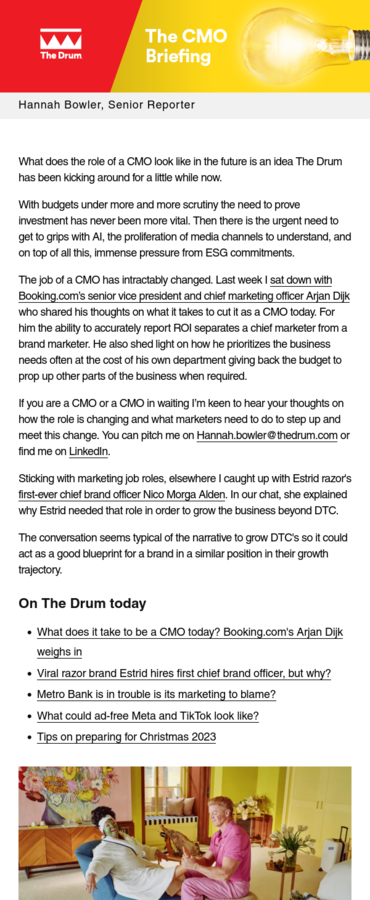WPP’s profit warning and disappointing Q3 – what the analysts say
A chaotic week in the lead-up to the trading update saw Mark Read firefight a bribery scandal in China and formally merge VMLY&R and Wunderman Thompson.

WPP has released financial results for the third quarter of 2023 / The Drum
A rollercoaster week at WPP, the largest employer in the advertising industry, has seen it announce a major agency merger and dismiss a media executive detained on bribery charges. But it’s the continued tech slowdown that’s giving chief executive Mark Read the real headache as he was forced to revise its income expectations for 2023 again to just 0.5-1%.
Net revenues at the holding company fell 5% during the third quarter of the financial year, according to its latest earnings report. Read said the figures were “somewhat below expectations” for the firm. “We had expected performance in Q3 to improve somewhat on Q1, partly due to easier comparators [last year’s numbers, used as a yardstick for short-term performance].”
Advertisement
Overall revenue in the third quarter of the year declined 1.8%, while revenue ‘less pass-through costs’ – net revenue – fell 0.6%. The results provide a window into the commercial health of the industry’s biggest agency group, and more details on both the company’s operations in China and its merger of VMLY&R and Wunderman Thompson.
WPP has updated its growth expectations for the rest of the year, from 1.5%-3% to just 0.5-1%. Read blamed the performance on client caution, particularly in the tech sector.
“Our top-line performance in Q3 was below our expectations and continued to be impacted by the cautious spending trends we saw in Q2, particularly across technology clients with more impact from this felt in GroupM over the summer than the first half,” he told investors.
GroupM: a simple plan
Low spending among GroupM firm’s tech clients – which account for around 17% of overall WPP revenue – and accounts lost to competitors, including Kimberly-Clark – contributed to low single-digit growth, even as the proportion of income brought in by WPP’s other networks declined. Revenue taken from tech clients such as Google and Amazon fell 12% in the last quarter.
According to the earnings statement, 51% of digital billings came in through GroupM. The network’s US business was particularly hard hit, prompting Read to say “there’s work to be done” in strengthening its execution. “I don’t believe there are systemic or structural issues… we can and we will do better,” he added.
”The story is really the GroupM performance in the United States,” explains Forrester principal analyst Jay Pattisall. ”The growth slowdown at GroupM was a sharp decline in the US, and it's reflective of their new business performance and the declines in media spending, particularly in the technology sector. Technology is 17% of WPP's total client portfolio, and it declined over 12%.”
” It’s a story of Google, Meta, Amazon and Apple, and their marketing spend.”
Advertisement
In response, the holding company has signaled a new phase of reorganization at the media network, with a focus on offering a single set of products through its three principal agencies Wavemaker, Mindshare and EssenceMediacom.
Read said that, like the VML merger, the move is intended to make the company more efficient by consolidating back office and admin operations while winning new business with the help of “stronger and more competitive media products and tech platforms.”
”Scale matters more in marketing than it did one year ago or five years ago,” he concluded. The company expects savings from both of those operations to total around £100m ($120m) over the next two years, Read said. It hopes the impact of the VML merger on its new business record, however, will come sooner. “We’re doing this to make the offer more competitive,” he said.
Though its data and media agency businesses still increased overall turnover over the last three months (0.1% and 1.6%, respectively) WPP’s creative agency businesses – chief among them, Wunderman Thompson and VMLY&R, collectively saw net revenues fall 1.1%. Ogilvy, in comparison, recorded growth. Reduced client spending also affected revenues at AKQA, production shop Hogarth, public relations firms FGS Global, H+K and BCW, and at specialist healthcare business CMI Media.
The firm’s investments in AI, including the acquisition of Satalia in 2021 and a strategic alliance with Nvidia struck this year, will take longer to have a bearing on the bottom line. But Pattisall says they’re likely a stronger pull for potential clients than a simplified GroupM product line.
”There’s a limit to what to what rebranding those products will accomplish. I think it really does come down to new products that they develop based upon their AI investments and perhaps some of their production investments,” he says.
”WPP is absolutely one of the leaders in this area and has made significant AI investments in terms of partnerships and technology and products that have not come to market and are not fully realized yet. When they are, I believe they will help significantly with content and creative commoditization.”
Suggested newsletters for you
For R3 partner Greg Paull, the reorganization of VML and the scale it hopes to deliver are promising signs for WPP’s future prospects - though rumbles over potential buyers are of concern.
“The pieces continue to be there – Ogilvy is performing well , the new VML will surely drive efficiencies and they continue to be the world’s largest media buyer,“ he tells The Drum. “The issue is getting a Leonard Bernstein-like conductor to orchestrate these pieces better as a single unit.
“WPP’s biggest challenge is going to come not from inside but from outside – with stock performance decline, Blackstone, Silver Lake and others are circling with some interest.“
China crisis
Regarding the detention of an unnamed GroupM executive on bribery charges last week, Read said that the holding company had commissioned an independent investigation of the case.
He told investors: “We’ve been asked by authorities in China not to comment on the specifics, but I can assure you, we take it very seriously and we’ve taken immediate action.
“We have dismissed the executives involved who worked for us and stopped dealing with the third parties who are alleged to be involved. We have senior leaders both within China and outside China, who have stepped in to manage it. And we’re instructing independent experts to carry out an independent investigation at this point. That’s all we can say.”
The holding company’s performance in China, and GroupM’s revenues across the Pacific will be of concern to Read, however. Revenue fell 4.3% in the third quarter and 4.1% for the first nine months of this year.
According to Xiaofeng Wang, principal analyst at Forrester, weak economic growth in the country is likely to drag on the company’s performance more than any potential reputational impact from the case.
“WPP’s negative growth in China is less likely to be a direct result of the bribery case, but more likely to be a combination of a weaker economic growth and the shift of brands’ media buying methods in China,” she says. Though GroupM is the market leader among media shops in China, its share (and that of ‘big six’ competitors) has been falling since 2020.
She explains: “That’s because more marketers/advertisers are shifting to direct media buying from big publishers, especially walled garden players like Alibaba, Tencent and Bytedance that provides sophisticated martech and adtech solutions to support large advertisers’ media buying… and in-house media buying when brands invest more in martech and adtech tools like CDP and DMP.”
Peer review
How does this all shape up next to WPP’s peers – holding company peers such as Interpublic Group (IPG), Omnicom, Havas and Publicis?
US-headquarted IPG, which owns agencies such as McCann, R/GA and Huge, saw net revenues slip 0.4% in the third quarter of the financial year while net revenue in its core US market declined -1.2%.
“Revenue performance did not measure up to expectations,” said IPG chief executive officer Philippe Krakowsky. Prevailing economic conditions, Krakowsky told investors, had provoked “an unmistakably more cautious tone in the business.”
By contrast, Omnicom saw organic revenue growth of 2.7% in the US and 3.3% organic revenue growth overall – while Havas recorded 4.5% organic growth, and 3% in North America.
Meanwhile, Havas boss Yannick Bolloré said that the group’s performance had lifted the financial results of parent company Vivendi as a whole. “The growth in revenues for the first nine months of 2023 reflects the validity of Vivendi’s strategy. Havas demonstrated the relevance of the transformation and internationalization actions we have implemented with them in recent years.”
As service businesses, agency groups are always at the mercy of client responses to economic weather. Krakowsky was not the only holdco boss to blame “decreases in client activity in the tech and telecom client sector that have been evident across our industry.
”Omnicom, IPG, WPP, they're all, you know, reporting ever so slight growth, flat growth.... that's reflective of the media business and the pullback in tech in spending from technology clients,” says Forrester. ”In contrast, you've got Havas at almost 5% growth and Publicis at over 5% growth - their portfolios are less dependent on technology and telecoms and their businesses are oriented differently.”
Though it’s unclear as yet whether or not the VML merger will trigger job cuts at WPP, at IPG losses are already underway. Krakowsky vowed to “simultaneously assess internal structural solutions in order to improve our growth profile.” IPG, which employed around 57,000 staff, had already reduced its workforce by around 1.5%, he said – equivalent to around 850 jobs.
R/GA and Huge saw “continued underperformance” according to IPG chief financial officer Ellen Johnson, while subsidiaries McCann, MullenLowe and FCB collectively recorded -4.1% organic growth; the former has also lost out on tech spending in recent months. Despite media wins, including General Mills, Krakowsky said that the group had not yet seen much benefit from new clients. “Some of the larger new business did not ramp at the pace that we anticipated,” he told investors.
By contrast, American rival Omnicom, which owns agencies such as TBWA, can boast of account wins among Uber, HSBC, Beiersdorf, Novartis, Under Armour and Amazon.
Stuart Pocock, managing partner of the Observatory International, summed up the outlook: "In the market, we’re seeing a lot of vacillation from clients on spend. All of a sudden the money is just not flowing around like it was."


